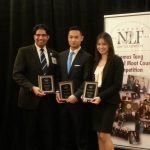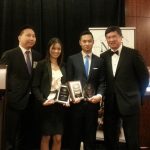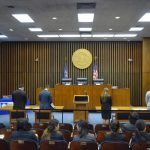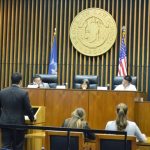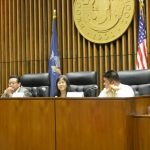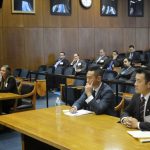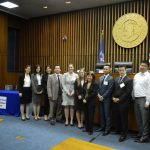Judges Needed for the Thomas Tang Moot Court Competition, NAPABA Convention 2014
- Whether the holding of Jordan v. De George, 341 U.S. 223 (1951), declining to find the phrase “crimes involving moral turpitude” void for vagueness when applied to fraud, extends to conduct involving intent to deceive.
2014 Thomas Tang Moot Court Competition
2014 Thomas Tang Moot Court Competition
The Thomas Tang Moot Court Competition is an appellate advocacy competition sponsored annually by the National Asian Pacific American Bar Association Law Foundation (NAPABA Law Foundation), an IRC § 501©(3) non-profit, charitable and educational affiliate of the National Asian Pacific American Bar Association (NAPABA). The NAPABA Law Foundation works closely with the National Asian Pacific American Law Students Association (NAPALSA) and its local affiliates at law schools across the country. The purpose of this Competition is to develop advocacy skills without regard to the merit of the petitioner’s or respondent’s cases.
The Competition was founded in 1993 and is named in honor of the late Honorable Thomas Tang, a respected jurist who was appointed to the U.S. Court of Appeals for the Ninth Circuit in 1977. Judge Tang’s decisions during his more than eighteen years on the Ninth Circuit reflected his strong commitment to civil rights for all people. Judge Tang was known for his kindness and warmth, and the leadership role he played in the Asian Pacific American legal community. Prior to his passing in 1995, Judge Tang provided tremendous support to NAPABA and its activities, including the creation of this national moot court competition.
The regional rounds of the Competition are conducted during October of each academic year throughout the country. The winner of each regional round will automatically advance to the finals of the competition, to be held in conjunction with the annual NAPABA Convention in Scottsdale, AZ, between November 5-9, 2014. The National Committee will also select additional high scoring teams from the regional rounds of the competition, to advance and compete during the finals of the competition. The Committee will select a minimum of twelve (12) teams to a maximum of sixteen (16) teams to compete in the finals of the TTMCC.
REGISTER & DOWNLOAD MATERIALS TODAY
Use the links below or follow the link in the title
The Thomas Tang Moot Court Problem
For more information, contact Hemanth Digumarthi.
St. John’s Law Team Achieves at Thomas Tang National Moot Court Competition
St. John’s Law Team Achieves at Thomas Tang National Moot Court Competition
On November 8, 2013, Jonathan Yi ‘14 and Lawson Huynh ’16 competed for St. John’s Law at the annual Thomas Tang National Moot Court Competition in Kansas City, Missouri. Coached by Alison Bomba ’14, the team advanced to the quarterfinals and earned second best brief. Lawson was also named second best oralist.
Click on the link in the title to read the full article. Congrats to the St. John team!
Thomas Tang Moot Court Judges Needed for NAPABA Convention
Please sign up to judge either one or both of the preliminary rounds via Wejoinin. (http://wejoinin.com/sheets/usknvhttp://wejoinin.com/sheets/usknv).
This year’s problem addresses the following issues:
I. Whether § 66.04 of the Apalsa Revised Statutes (“ARS”) precluding a public defender from withdrawing on the basis of excessive workload or lack of resource violates the right to effective assistance of counsel guaranteed by the Sixth Amendment to the Constitution of the United States.
A. Whether ARS § 66.04 is facially unconstitutional.
B. Whether ARS § 66.04 is unconstitutional as applied in this case.
II. Whether the sanctions imposed on Appellant by the Professional Ethics Board of the State Bar of Apalsa violated her rights under the Constitution of the United States.
A. Whether the sanctions imposed for refusing to comply with a court order to represent a criminal defendant violate the Fifth Amendment right to due process.
B. Whether the sanctions imposed for Appellant’s public statement regarding her refusal to comply with a court order to represent a criminal defendant violate the First Amendment’s guarantee of freedom of expression.
Thomas Tang Moot Court Competition Deadline Coming Up Sept. 19
Law students: Gain valuable oral advocacy and brief writing skills while getting your shot to compete for scholarships totaling $10,000. Sign up now for the Thomas Tang Moot Court Competition, organized by the NAPABA Foundation and NAPABA Judicial Council.
The Northeast Regionals are being held at Brooklyn Law School on October 5. Brief is due September 19. For more information, contact [email protected].
For more details about the Thomas Tang Moot Competition, including entry forms and rules, go to http://bit.ly/tangmoot.
Judges Needed for Thomas Tang Moot Court Competition
Hemanth Digumarthi from the Host Committee of the 2011 NAPABA National Convention in Atlanta sends this message asking for AABANY members to volunteer time at the convention to serve as judges in the Thomas Tang Moot Court Competition finals:
Judges are needed for the Thomas Tang Moot Court competition in Atlanta. The rounds will take place, Friday, November 18 from 10:00 to 11:30 and from 2:00 p.m. to 3:30 p.m. You can judge one or both rounds. If there are any AABANY members planning to attend the NAPABA convention and would like to volunteer, please contact Hemanth Digumarthi at [email protected].
The issues in this year’s Thomas Tang Moot Court Competition are:
I. WHETHER THE PRESERVING AMERICAN VALUES IN EDUCATION (PAVE) ACT VIOLATES THE FIRST AMENDMENT’S GUARANTEE OF FREEDOM OF SPEECH.
A. Whether the deferential standard of review articulated in Hazelwood School District v. Kuhlmeier, 484 U.S. 260 (1988) for assessing high school curricula should be extended to universities.
B. Whether the PAVE Act’s curricular restrictions violate the free speech clause of First Amendment under either a strict scrutiny or a rational basis standard of review.
II. WHETHER THE PRESERVING AMERICAN VALUES IN EDUCATION (PAVE) ACT VIOLATES THE FOURTEENTH AMENDMENT’S GUARANTEE OF EQUAL PROTECTION.
A. Whether the PAVE Act’s curricular restrictions constitute a racial classification subject to strict scrutiny.
B. Whether the PAVE Act’s curricular restrictions violate the equal protection clause of the Fourteenth Amendment under either a strict scrutiny or a rational basis standard of review.


